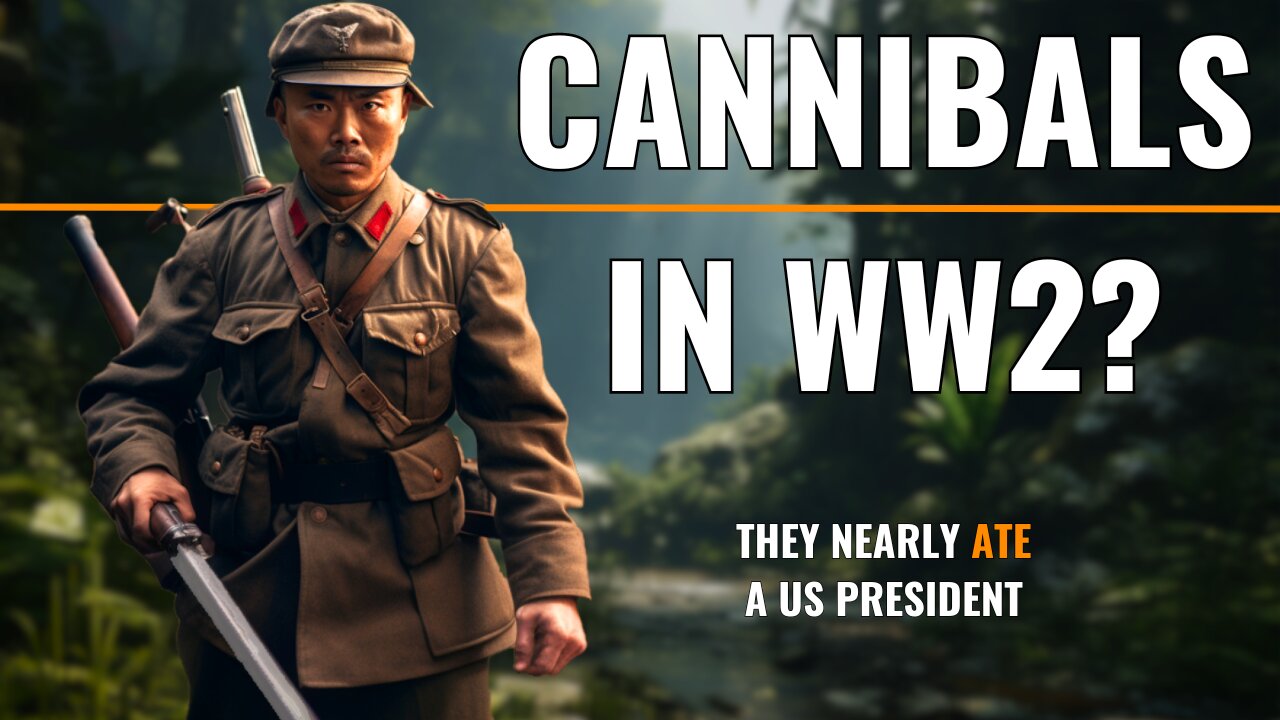Premium Only Content

Unknown Horrors of the Imperial Japanese Army During WW2
(An edited version for all audiences)
Ever heard of soldiers munching on other soldiers? Yeah, that happened.
________
To truly grasp the intensity of these horrors, we must first understand the ethos that drove many Japanese soldiers: Bushidō, a Japanese equivalent of a knight’s chivalric code.
It was as intense as it sounds. But it was also about a lot more than just swinging a katana and wearing armor.
Originating in the Edo period, which spanned from 1603 to 1868, Bushidō was a way of life, deeply ingrained in the samurai culture.
And while it might be tempting to draw parallels with European chivalry, let's not get too hasty. Sure, there were similarities, like a focus on honor and loyalty… to a degree.
But Bushidō had its own unique flavor, a blend of Confucianism, Shinto, and Zen Buddhism, giving it a depth and complexity that was distinctly Japanese, emphasizing values like sincerity, frugality, and loyalty above all else.
Loyalty especially, was paramount, even if not all samurai adhered to this principle… let alone all IJA members.
The pursuit of excellence in martial arts? That was expected of course. But it wasn't just about physical prowess. It was about the mind, strategy, discipline, and honor.
Honor until death. In fact, the concept of "seppuku" or ritual suicide was a testament to this. If a samurai felt they had lost their honor, they'd rather end their life than live in disgrace, ritualistically stabbing themselves in the stomach with the aim of disembowelment.
Ever heard of soldiers munching on other soldiers? Yeah, that happened.
________
To truly grasp the intensity of these horrors, we must first understand the ethos that drove many Japanese soldiers: Bushidō, a Japanese equivalent of a knight’s chivalric code.
It was as intense as it sounds. But it was also about a lot more than just swinging a katana and wearing armor.
Originating in the Edo period, which spanned from 1603 to 1868, Bushidō was a way of life, deeply ingrained in the samurai culture.
And while it might be tempting to draw parallels with European chivalry, let's not get too hasty. Sure, there were similarities, like a focus on honor and loyalty… to a degree.
But Bushidō had its own unique flavor, a blend of Confucianism, Shinto, and Zen Buddhism, giving it a depth and complexity that was distinctly Japanese, emphasizing values like sincerity, frugality, and loyalty above all else.
Loyalty especially, was paramount, even if not all samurai adhered to this principle… let alone all IJA members.
The pursuit of excellence in martial arts? That was expected of course. But it wasn't just about physical prowess. It was about the mind, strategy, discipline, and honor.
Honor until death. In fact, the concept of "seppuku" or ritual suicide was a testament to this. If a samurai felt they had lost their honor, they'd rather end their life than live in disgrace, ritualistically stabbing themselves in the stomach with the aim of disembowelment.
Ever heard of soldiers munching on other soldiers? Yeah, that happened.
________
To truly grasp the intensity of these horrors, we must first understand the ethos that drove many Japanese soldiers: Bushidō, a Japanese equivalent of a knight’s chivalric code.
It was as intense as it sounds. But it was also about a lot more than just swinging a katana and wearing armor.
Originating in the Edo period, which spanned from 1603 to 1868, Bushidō was a way of life, deeply ingrained in the samurai culture.
And while it might be tempting to draw parallels with European chivalry, let's not get too hasty. Sure, there were similarities, like a focus on honor and loyalty… to a degree.
But Bushidō had its own unique flavor, a blend of Confucianism, Shinto, and Zen Buddhism, giving it a depth and complexity that was distinctly Japanese, emphasizing values like sincerity, frugality, and loyalty above all else.
Loyalty especially, was paramount, even if not all samurai adhered to this principle… let alone all IJA members.
The pursuit of excellence in martial arts? That was expected of course. But it wasn't just about physical prowess. It was about the mind, strategy, discipline, and honor.
Honor until death. In fact, the concept of "seppuku" or ritual suicide was a testament to this. If a samurai felt they had lost their honor, they'd rather end their life than live in disgrace, ritualistically stabbing themselves in the stomach with the aim of disembowelment.
-
 LIVE
LIVE
The Rubin Report
59 minutes agoListen to ‘The View’ Crowd Gasp as Whoopi Doubles Down on Extremist Rhetoric
21,581 watching -
 1:16
1:16
Steven Crowder
40 minutes agoI'm Back
68.1K345 -
 LIVE
LIVE
MattMorseTV
59 minutes ago🔴Trump's Oval Office DECLARATION.🔴
1,444 watching -
 LIVE
LIVE
Right Side Broadcasting Network
47 minutes agoLIVE: President Trump Makes an Announcement - 9/30/25
2,823 watching -
 LIVE
LIVE
LFA TV
12 hours agoBREAKING NEWS ALL DAY! | TUESDAY 9/30/25
3,478 watching -
 1:01:24
1:01:24
VINCE
2 hours agoDemocrats Can't Keep This Sex Criminal Locked Up | Episode 136 - 09/30/25
197K121 -
 LIVE
LIVE
Badlands Media
8 hours agoBadlands Daily: September 30, 2025
4,262 watching -
 LIVE
LIVE
The Big Mig™
2 hours agoPeace In The Middle East Or War?
4,579 watching -
 LIVE
LIVE
The State of Freedom
4 hours ago#337 What’s Behind the LA GOP Dysfunction? Insiders, Denialists & Deplorables
839 watching -
 1:42:59
1:42:59
Dear America
3 hours agoCharlie’s Killer Fights For NO DEATH PENALTY!! NOT HAPPENING!! + Gov Shutdown Imminent!!
138K84